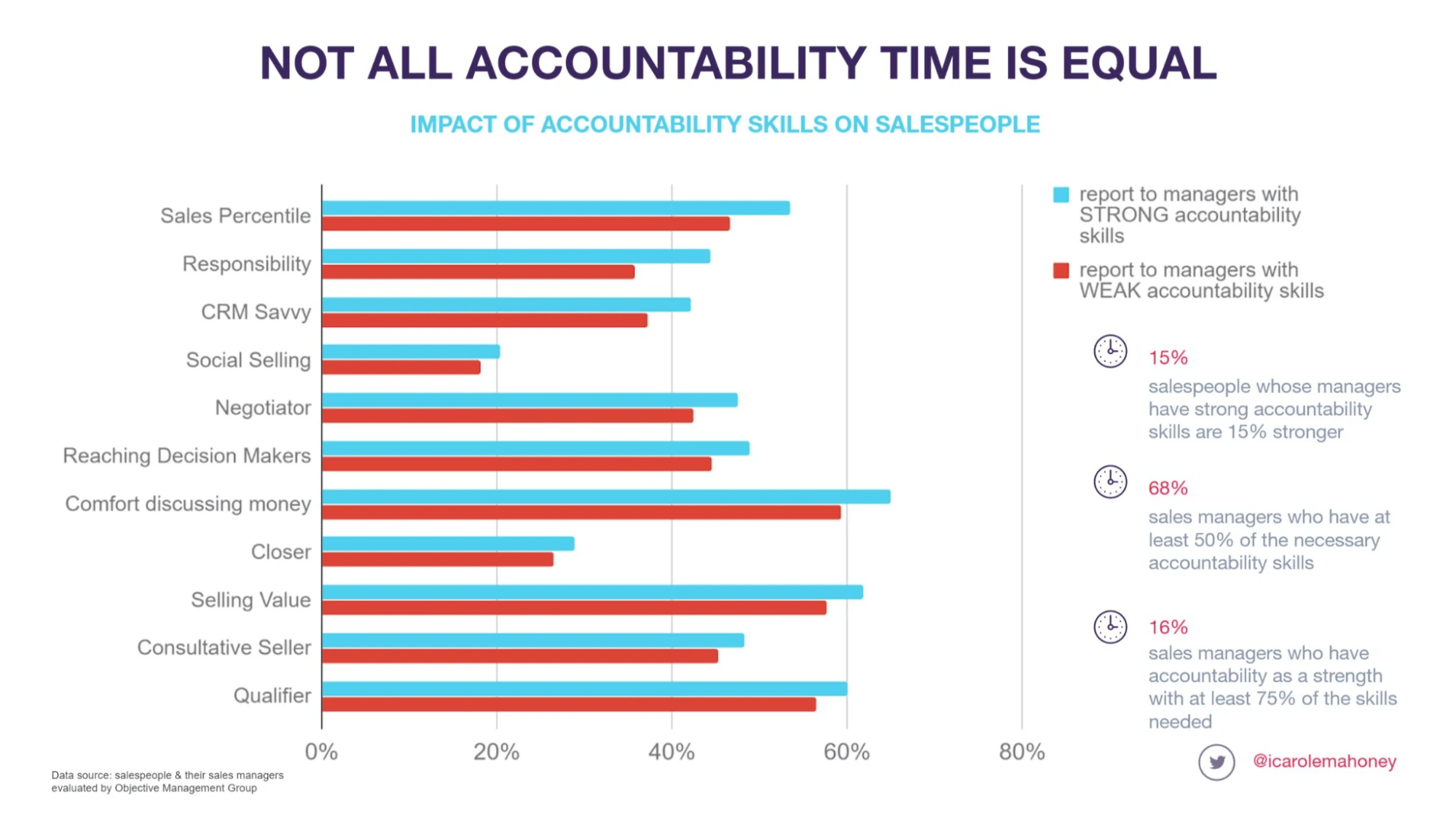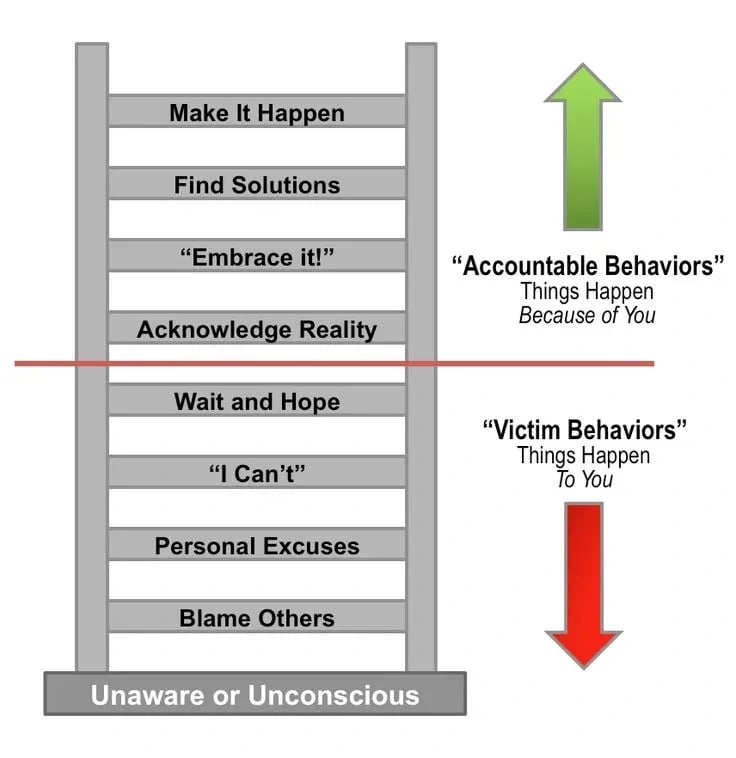A good sales team comprises a unique blend of individuals. Each individual in this team brings some special talent, skill, or experience to the table. By using these in a complementary manner, an effective team leader can turn the team from good to exceptional. The team leader should be able to motivate these diverse individuals to use their abilities and experience in an optimal manner. The best way to do this is by creating a culture of accountability in the sales team.
Accountability in sales teams
Accountability is of prime importance for steering a sales team toward high performance. Constructive accountability in sales is not unilateral. For maximum efficiency, a sales team must embrace three-way accountability wherein the sales representatives are accountable to the leader as well as to each other, and the leader is also accountable to the sales team.
Sales representatives need to align their efforts with the goals set by the leaders. They must be honest and show integrity. The input of sales representatives can go a long way in helping sales leaders make advantageous decisions, formulate rational goals and achieve desired outcomes. The sales leader needs to motivate the sales team and be a role model.
Lateral accountability is often overlooked, but it is highly important for a sales team. To achieve sales goals and exceed expectations, sales representatives need to willingly support and help each other. They should coach their peers and share secrets to success. They must discuss the reasons behind failures, identify problem areas, and find solutions together. The sales representatives need to be transparent with each other. They should learn to work around conflicting opinions and share best practices. It is the team leader who lays the foundation for lateral accountability in a sales team.
Importance of creating a culture of accountability
In general, accountability seems to have negative connotations. If you simply talk about accountability, team members might associate it with mistrust and suspicions. The success of a sales team largely depends on its accountability. How well a sales team responds to the concept of accountability depends on its leader.
As a sales leader, it is up to you to build a culture where accountability is not only accepted and practiced but also highly sought after and understood well. You are the person who needs to educate the sales team that accountability is not about pinning blame, but it is about taking ownership of efforts and recognizing hard work. You need to develop a favorable environment where there is no stigma attached to accountability.
A culture of accountability is one where there is intrinsic motivation and commitment to goals. In such a culture, it is a natural practice to take willing responsibility for one’s actions. Each team member strives to improve his/her performance, and therefore the performance levels of the team rise as well. Better alignment of goals leads to faster achievement. People do not make excuses for their actions, take feedback positively, and don’t have to be pressured toward team goals. The team members themselves will put in efforts to grow their skills.
The team under a leader with better accountability skills will perform better. See how better accountability impacts a variety of sales factors:

Problems that arise due to lack of accountability
Accountability is about each team member doing their part and voluntarily choosing to take responsibility for the outcome. It is not about creating fear or intimidating the team members into performing better. Several problems arise due to the lack of accountability in sales teams. These include but are not limited to the following:
- Mistrust between the leader and the team members
- Mistakes and excuses resulting in lower performance and missed goals
- Victim mentality and blame games
- Low motivation and increased turnover
- Lack of accountability regarding the application of skills learned in sales training diminishes the effectiveness of the training and results in a waste of time and money spent on the training.
How can a leader create a culture of accountability in sales teams?
When a leader is successful in creating a culture of accountability, he will be able to see results in the form of a highly-driven, passionate team that consistently performs well. Read on to find out how you can achieve the feat of creating such a positive and engaging culture.
- Be clear: As a sales leader, you need to be clear about what being accountable means. You need to make sure that all the team members understand accountability in the way that you mean it. There should also be clarity of goals, expectations, and timelines.
- Be a role model for accountability: As with all other cases, you, the leader, need to lead by example, even in this case. Hold yourself accountable in front of your team members. Take responsibility for your team. Do not exempt yourself or make excuses. Consider getting a periodic evaluation from your team members. Try to ensure that you and your team members are always on a higher rung on the ladder of accountability.

- Maintain transparency: To create a culture of accountability, there should be transparency about goals and work. Everyone on the team needs to know the work each member does and the goals he/she needs to achieve. This is how lateral and reciprocal accountability will develop. Encourage the team members to help each other achieve their goals.
- Recognize and reward: Recognize initiative and effort and reward exceptional performance. Recognition and rewards for good performance have a positive impact on employee engagement. For the times when a team member fails to achieve goals, you should have a corrective action plan that can help them perform better next time.
- Enable the success of your team: Empower people with authority wherever required. Remove the obstacles that block the effectiveness of your team. Ensure that you respond in time to all questions and requests. Support your team with resources and tools like customized CRM. You need to create a safe environment where your team members can learn and grow.
- Regular follow-up: Hold regular meetings to review the team’s progress. Each team member must be encouraged to share about their success and seek advice wherever they fell short. All the team members can learn from each other’s mistakes and pick up best practices. You should also hold some one-on-one meetings with your team members, where they can discuss with you the next steps they intend to take related to their specific targets, and you can offer guidance. Develop a list of employee feedback examples that have produced positive results and refer to those examples for inspiration in similar situations.
- Ongoing coaching: As a leader, you need to train your team members to bring out the spirit of accountability in them. Apart from training during the onboarding process, you need to ensure that team members receive ongoing coaching to recognize unproductive habits and learn new success tactics. You can also consider adding fresh skills and tactics to your own repertoire by taking a team leader course. Only through effective leadership can you utilize the best sales talent optimally. It could prove beneficial to consult a few business coaches to further hone your leadership skills.
Creating and sustaining a culture of accountability requires consistent and well-planned efforts on the part of the leader. These efforts pay off in the form of a team that consistently performs well and aims higher.




